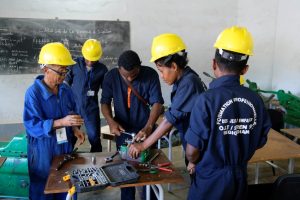The Human Capital Report 2015
Inglés
Otras fuentes
Los expertos de numerosos organismos nacionales, regionales e internacionales han tenido la generosidad de compartir sus opiniones, experiencias y conclusiones sobre las competencias, ayudando así a los responsables de políticas, entre otros actores, a entender los vínculos existentes entre la educación, la formación y el mundo del trabajo y la forma de integrar las competencias en la planificación del desarrollo nacional para promover el empleo y el crecimiento económico.

Acceso a la formación

El acceso de todos a una educación de calidad, a la formación profesional y a la formación en el puesto de trabajo es un principio fundamental de la cohesión social y el crecimiento económico. Algunos grupos de personas pueden requerir una atención específica para poder beneficiarse de las oportunidades de educación, formación y empleo.
Esto se aplica particularmente a los jóvenes desfavorecidos, los trabajadores menos calificados, las personas con discapacidad y aquellas que viven en comunidades rurales. El atractivo de la educación y formación profesionales se ve reforzado cuando se combina con formación empresarial y cuando las políticas públicas alientan la utilización de mayores competencias por parte de las empresas.
Otros temas

Trabajos de investigación y síntesis
Documentos de trabajo, informes y otras publicaciones de organizaciones internacionales, instituciones académicas y organismos bilaterales. Resultados de investigación para estimular un debate bien fundamentado sobre las competencias, el empleo y la productividad.

The Human Capital Report provides one such tool: the Human Capital Index. The Index quantifies how countries are developing and deploying their human capital and tracks progress over time. It takes a lifecourse approach to human capital, evaluating the levels of education, skills and employment available to people in five distinct age groups, starting from under 15s to the over 65s. The Index covers 124 countries, representing between them 92% of the world’s people and 98% of its GDP. It measures present performance against an ideal benchmark, and offers insight into how well a country is positioned for deploying talent in the future. In addition to the Index, the Report provides comprehensive information on the talent base in each country, including information on education levels of the employed, unemployed and the inactive members of the population as well as the specific qualifications of the latest entrants to the workforce.